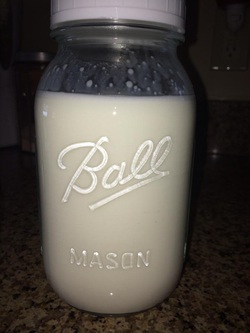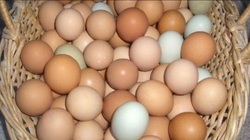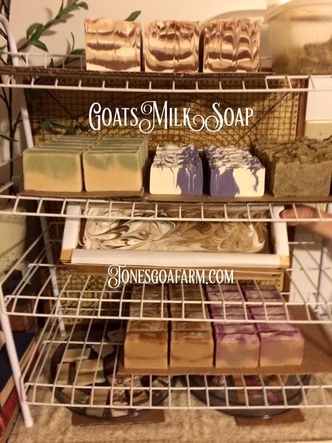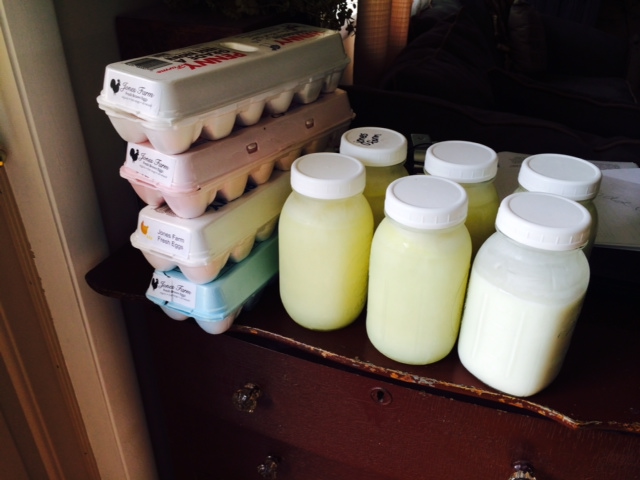
Jones Farm started back in 2006, with just two chickens.
A family friend and elementary school teacher, hatched eggs in her classroom. She ended up with two baby chicks who needed a home. Soon after, we added 50+ chickens to our farm. The boys also bought an egg fridge that sits on our front porch. Self-serve and country style!
In 2013, we added goats to our hobby farm. Nigerian Dwarf goats were
the perfect choice for us. Currently, we have 30+ Nigerian Dwarfs.
They provide excellent milk, high in butterfat, and delicious!
They are also a smaller size and perfect for kids!

Goat Daddy!
Todd is always up for building new pens, kidding stalls, chicken runs and more! He is also "slightly obsessed" with hatching baby chicks in our incubator! The absolute best breakfast maker around serves fresh eggs daily!
Todd is always up for building new pens, kidding stalls, chicken runs and more! He is also "slightly obsessed" with hatching baby chicks in our incubator! The absolute best breakfast maker around serves fresh eggs daily!
We also raise Cavapoos and Goldendoodles. Click on the Puppy tabs for details!

Why we love our RAW Milk:
In her book, Nourishing Traditions, Sally Fallon writes:
“Raw milk contains lactic-acid-producing bacteria that protect against pathogens. Pasteurization destroys these helpful organisms, leaving the finished product devoid of any protective mechanism should undesirable bacteria inadvertently contaminate the supply. Raw milk in time turns pleasantly sour while pasteurized milk, lacking beneficial bacteria, will putrefy.
But that’s not all that pasteurization does to milk. Heat alters milk’s amino acids lysine and tyrosine, making the whole complex of proteins less available; it promotes rancidity of unsaturated fatty acids and destruction of vitamins. Vitamin C loss in pasteurization usually exceeds 50%; loss of other water-soluble vitamins can run as high as 80%; the Wulzen or anti-stiffness factor is totally destroyed. Pasteurization alters milk’s mineral components such as calcium, chlorine, magnesium, phosphorus, potassium, sodium and sulphur as well as many trace minerals, making them less available. There is some evidence that pasteurization alters lactose, making it more readily absorbable. This, and the fact that pasteurized milk puts an unnecessary strain on the pancreas to produce digestive enzymes, may explain why milk consumption in civilized societies has been linked with diabetes.
Last but not least, pasteurization destroys all the enzymes in milk— in fact, the test for successful pasteurization is absence of enzymes.”
In her book, Nourishing Traditions, Sally Fallon writes:
“Raw milk contains lactic-acid-producing bacteria that protect against pathogens. Pasteurization destroys these helpful organisms, leaving the finished product devoid of any protective mechanism should undesirable bacteria inadvertently contaminate the supply. Raw milk in time turns pleasantly sour while pasteurized milk, lacking beneficial bacteria, will putrefy.
But that’s not all that pasteurization does to milk. Heat alters milk’s amino acids lysine and tyrosine, making the whole complex of proteins less available; it promotes rancidity of unsaturated fatty acids and destruction of vitamins. Vitamin C loss in pasteurization usually exceeds 50%; loss of other water-soluble vitamins can run as high as 80%; the Wulzen or anti-stiffness factor is totally destroyed. Pasteurization alters milk’s mineral components such as calcium, chlorine, magnesium, phosphorus, potassium, sodium and sulphur as well as many trace minerals, making them less available. There is some evidence that pasteurization alters lactose, making it more readily absorbable. This, and the fact that pasteurized milk puts an unnecessary strain on the pancreas to produce digestive enzymes, may explain why milk consumption in civilized societies has been linked with diabetes.
Last but not least, pasteurization destroys all the enzymes in milk— in fact, the test for successful pasteurization is absence of enzymes.”

Why we love our Farm Fresh Eggs:
LATEST RESULTS: New test results show that pastured egg producers are far superior than the commercial industry when it comes to vitamin D! Eggs from hens raised on pasture show 4 to 6 times as much vitamin D as typical supermarket eggs.
RESULTS FROM OUR PREVIOUS STUDY: Eggs from hens allowed to peck on pasture are a heck of a lot better than those from chickens raised in cages! Most of the eggs currently sold in supermarkets are nutritionally inferior to eggs produced by hens raised on pasture. Eggs from hens raised on pasture may contain:
• 1⁄3 less cholesterol • 1⁄4 less saturated fat • 2⁄3 more vitamin A • 2 times more omega-3 fatty acids • 3 times more vitamin E • 7 times more beta carotene
These amazing results come from 14 flocks around the country that range freely on pasture or are housed in movable pens that are rotated frequently to maximize access to fresh pasture and protect the birds from predators.
Info Credit: Mother Earth News
LATEST RESULTS: New test results show that pastured egg producers are far superior than the commercial industry when it comes to vitamin D! Eggs from hens raised on pasture show 4 to 6 times as much vitamin D as typical supermarket eggs.
RESULTS FROM OUR PREVIOUS STUDY: Eggs from hens allowed to peck on pasture are a heck of a lot better than those from chickens raised in cages! Most of the eggs currently sold in supermarkets are nutritionally inferior to eggs produced by hens raised on pasture. Eggs from hens raised on pasture may contain:
• 1⁄3 less cholesterol • 1⁄4 less saturated fat • 2⁄3 more vitamin A • 2 times more omega-3 fatty acids • 3 times more vitamin E • 7 times more beta carotene
These amazing results come from 14 flocks around the country that range freely on pasture or are housed in movable pens that are rotated frequently to maximize access to fresh pasture and protect the birds from predators.
Info Credit: Mother Earth News

Jones Farm Goats Milk Soap!
Many people are still washing their skin with soap made with water. Switching to soap made with goat milk can truly benefit your skin’s health. Goat milk soap is wonderful for people with dry or sensitive skin. It is also perfect for keeping skin healthy.
Unprocessed goat milk, fresh from the farm contains the following benefits:
1. Alpha Hydroxy Acids. Goat milk contains alpha-hydroxy acids such as lactic acid which help remove dead skin cells from your skin’s surface. This leaves new cells on the surface of your skin that are smoother and younger looking.
2. Vitamins. Goat milk contains many vitamins, but is particularly high in Vitamin A, which is necessary to repair damaged skin tissue, and maintain healthy skin. Vitamin A reduces lines and wrinkles, controls acne, and provides some psoriasis relief.
3. Cream. Fat molecules are an important part of making good soap. The cream that is present in goat milk helps boost the moisturizing quality of goat milk soaps. It's super helpful for dry skin. Keeping skin naturally moisturized helps keep skin healthy.
4. Minerals. Goat milk contains important minerals for the skin such as selenium. Selenium is believed by scientists to have an important role in preventing skin cancer. Selenium can also help prevent damage to the skin from excessive time in the sun.
Regardless of whether your skin is healthy or not, it will certainly benefit from using a handmade soap, made not with water, but with unprocessed farm fresh goats milk.
Many people are still washing their skin with soap made with water. Switching to soap made with goat milk can truly benefit your skin’s health. Goat milk soap is wonderful for people with dry or sensitive skin. It is also perfect for keeping skin healthy.
Unprocessed goat milk, fresh from the farm contains the following benefits:
1. Alpha Hydroxy Acids. Goat milk contains alpha-hydroxy acids such as lactic acid which help remove dead skin cells from your skin’s surface. This leaves new cells on the surface of your skin that are smoother and younger looking.
2. Vitamins. Goat milk contains many vitamins, but is particularly high in Vitamin A, which is necessary to repair damaged skin tissue, and maintain healthy skin. Vitamin A reduces lines and wrinkles, controls acne, and provides some psoriasis relief.
3. Cream. Fat molecules are an important part of making good soap. The cream that is present in goat milk helps boost the moisturizing quality of goat milk soaps. It's super helpful for dry skin. Keeping skin naturally moisturized helps keep skin healthy.
4. Minerals. Goat milk contains important minerals for the skin such as selenium. Selenium is believed by scientists to have an important role in preventing skin cancer. Selenium can also help prevent damage to the skin from excessive time in the sun.
Regardless of whether your skin is healthy or not, it will certainly benefit from using a handmade soap, made not with water, but with unprocessed farm fresh goats milk.


